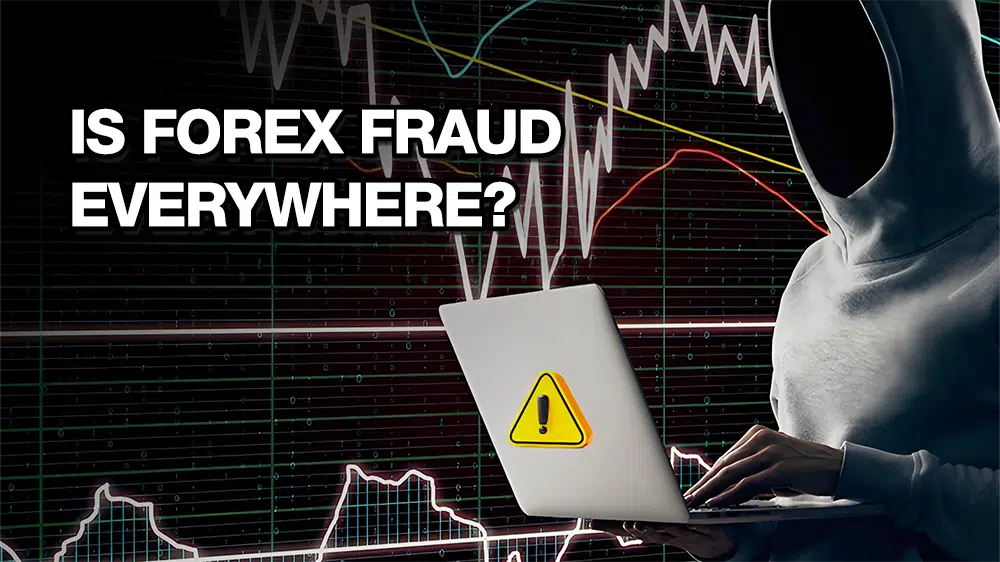Is Forex Fraud Everywhere? Uncovering Common Traps and Self-Protection Strategies to Safeguard Your Trading
Why is Forex Fraud So Rampant?
The foreign exchange market, with its enormous trading volume and 24-hour operation, attracts investors from all over the world. This decentralized global financial market boasts significant daily liquidity, offering numerous participants potential profit opportunities. However, in this seemingly opportunity-rich environment, forex fraud is a constant shadow, with tactics becoming increasingly sophisticated, causing countless traders to suffer losses. These scams not only erode personal wealth but also shake the very foundation of market trust.
Although forex trading is a legitimate and necessary tool for government agencies and large financial institutions to manage international exchange rate fluctuations, for the vast majority of retail investors, it is inherently associated with extremely high risks and even the direct threat of fraudulent activities. The high liquidity, high leverage, and round-the-clock operation of the forex market provide a fertile ground for malicious actors. Many retail investors, lacking experience and risk awareness, often become ideal targets for fraudulent groups due to their desire for quick riches and a lack of understanding of market mechanisms. This makes forex fraud not an isolated incident, but an inevitable outcome of the combination of market structural characteristics and investor psychological vulnerabilities, highlighting the long-term importance of continuous financial education and strengthening preventive awareness.
Unmasking Forex Scam Tactics: Have You Encountered These Red Flags?
Scammers’ tactics are ever-changing, but they follow a predictable pattern. They excel at exploiting human weaknesses, packaging alluring promises to gradually lead victims into traps. Understanding these common “forex scam” models is the first step toward self-protection. Scammers typically deceive individuals through false promises, setting up fake platforms, and using misleading advertising. They often promise high returns and extremely low risks to lure investors in.
The Lure of “Guaranteed Profits” or “Low-Risk, High-Return”: Is It a Forex Scam?
In the common script of “forex scams,” the most captivating element is the promise of unrealistic profits. Scammers use exaggerated claims like “guaranteed profits,” “low-risk, high-return,” or even “earn money while you sleep” to entice inexperienced traders. For example, they might claim to offer investment opportunities with a “98% success rate” or the ability to “earn tens of thousands of dollars in a few weeks,” accompanied by high-pressure sales tactics such as “limited-time offers” or “limited spots available” to create a sense of urgency, forcing investors to make quick decisions without sufficient thought. These claims are often supported by fake success stories or “inside information,” making victims believe them wholeheartedly.
Related recommendation: What is FOMO? How to Avoid the Psychological Trap of “Fear of Missing Out” in Trading?
This scam model essentially exploits the information asymmetry among market participants, as well as the human desire for rapid wealth growth and the natural aversion to risk. When market information is not transparent, or when investors lack sufficient financial knowledge to judge the reasonableness of the promises, the lure of “guaranteed profits” is more easily accepted. This is not just simple deception but a precise exploitation of investors’ psychological weaknesses, highlighting the importance of financial education in bridging this information gap.
However, the real financial market is full of uncertainty, and any “guarantee” should be seen as a serious red flag. Many of these “forex scams” are essentially variations of Ponzi schemes or pyramid schemes. In these scams, fraudsters use new investors’ funds to pay “profits” to earlier investors, creating the illusion of a continuously profitable investment project. As long as new money keeps flowing in, the scheme can maintain its superficial operation, but once the inflow of new funds stops, the entire scam quickly collapses due to the lack of actual trading activity, leaving all participants with nothing. Furthermore, high-pressure sales tactics commonly used by scammers, such as claiming “limited opportunities” or “special price today,” aim to deprive potential victims of the time to think calmly and verify information, forcing them to make investment decisions driven by emotion. This shows that regardless of the form of the scam, exploiting psychological manipulation to bypass the victim’s rational defenses is a core and common strategy. Therefore, any investment opportunity that demands “immediate action” or creates a sense of “scarcity” should be treated with extreme caution, which is a universal principle for identifying forex scams.
Why Are Funds Difficult to Withdraw? How Forex Scams Make Your Money Disappear
When victims of “forex scams” try to withdraw their funds or profits, they often encounter numerous obstacles. The fraudulent group will come up with various excuses, such as needing “additional verification,” “paying high handling fees,” “resolving technical issues,” or “reaching a higher trading volume” to allow withdrawals. These are typical delay tactics aimed at getting victims to invest more money or eventually give up on withdrawing out of exhaustion.
The ultimate goal of the scam is to illegally obtain and possess the victim’s funds. In the early stages of the scam, fraudsters create a false illusion of “profits” to entice victims to invest more. However, when victims attempt to cash out these “profits” or their principal, the true nature of the scam is revealed through various withdrawal barriers. This means that difficulty in withdrawing is the final link in the scam cycle and a key moment for investors to clearly identify the scam and take action.
In worse cases, these “forex scam” platforms are fake themselves. They may have professional-looking websites and trading interfaces, but in reality, investors’ funds never enter the forex market for trading. Instead, they are directly misappropriated by the scammers for their personal gain. Once victims realize they have been deceived, these fake platforms often become unresponsive or disappear completely, leaving investors with total losses. Additionally, some unscrupulous brokers may secretly erode investors’ funds through methods like spread manipulation (artificially increasing the difference between the buy and sell prices) or price slippage (the price deviating from the expected price when an order is executed). This type of scam is more covert than outright refusal to withdraw because it maintains the facade of “trading” while secretly siphoning profits from traders. This reveals that scams are not limited to simply “taking the money and running,” but also involve extracting profits from victims through seemingly legitimate trading mechanisms. For traders who lack a technical background or a deep understanding of the market, this tactic is even harder to identify, highlighting the importance of enhancing professional knowledge and choosing transparent platforms.
Related recommendation: Who Determines Forex Prices? Can Forex Prices Be Manipulated?
Are Automated Trading Systems and Signal Services Breeding Grounds for Forex Scams?
With the development of technology, automated trading systems (commonly known as EAs or trading robots) and signal services have become new variants of “forex scams.” Scammers package these systems or services as “intelligent software,” “secret formulas,” or “expert signals,” claiming they can automatically execute trades and generate “stable and high profits,” even showcasing “amazing returns of 4000%” or “a 98% success rate” to attract attention.
Traditional scams often rely on interpersonal interaction, while automated trading systems and signal services are cloaked in “high-tech.” Fraudulent groups use terms like “intelligent” and “secret formula” to create a facade of technological advancement and professional reliability, which is highly appealing to modern investors seeking efficiency and simplicity. This phenomenon reflects the rapid adaptability of fraudulent groups to new technologies and their tendency to use the complexity of technology to conceal their fraudulent nature. Therefore, investors should not only be wary of human deception but also remain cautious of seemingly “intelligent” or “automated” investment tools and demand independent performance verification.
However, these promotions are often exaggerated, and the signals or performance reports they provide lack independent verification and may even be fabricated. Many such “forex scams” use unregulated brokers to display “good” trading results, but when traders open accounts on these platforms, they find that the actual spreads and commissions are much higher than advertised, thus eating into their profits.
Furthermore, some signal services require high subscription fees or only provide signals after the trader opens an account with a specific broker. In this case, the main source of income for the signal provider or EA seller may be the sale of the service or commission kickbacks from the recommended broker, rather than the actual profits from their own trading. This may involve a conflict of interest, leading to recommended trades that are not truly in the trader’s best interest. This model reveals the core business model behind such scams: profiting by charging fees or receiving commission rebates, rather than through real, successful trading. Understanding this can help investors fundamentally judge the motives of the service provider and remain vigilant about the question, “If the signals are so good, why are they selling them?”
How to Identify Forex Scams: Spotting Suspicious Signs in the Details
The key to identifying “forex scams” lies in careful observation and being wary of opportunities that are “too good to be true.” When scammers design their schemes, they often leave behind flaws. By mastering these identification techniques, you can significantly reduce the risk of being deceived.
What Are the Common Traits of Forex Scam Platforms? Judging Authenticity from Websites and Contact Information
Key clues to determining whether a forex platform is a “forex scam” are often hidden in the details of its website and contact information. First, scam websites often exhibit a “too good to be true” characteristic: the page design may be overly flashy, filled with exaggerated profit claims, yet may contain typos, grammatical errors, or broken links. These technical and content flaws indicate that the fraudulent group has invested very little in website development, aiming for a quick launch and quick profits. Once the scam is exposed or the money is secured, they will quickly shut down the website and create a new one to evade investigation.
Second, it is important to check the website’s history. Scam websites usually have a short lifespan; even if they claim to have been around for years, their domain registration may only be a few weeks or months old. Traders can verify this using domain lookup tools (like ICANN). This “low-cost, high-turnover” operational model results in poor-quality websites and services, which serves as an important clue for investors to identify their fraudulent nature.
Furthermore, legitimate brokers usually provide a clear physical address, while scam platforms may lack an address, provide a fake one, or simply claim to be registered in an “offshore” location, making it difficult to trace them. In terms of contact information, if a platform only offers live chat or email without a callable customer service phone number, this is a major “forex scam” red flag. Legitimate financial institutions must comply with strict “Know Your Customer” (KYC) and Anti-Money Laundering (AML) regulations and provide clear, verifiable contact and registration information to the public. Scammers, on the other hand, avoid leaving any traceable clues to escape legal liability. Therefore, a platform’s level of transparency, including its operational information, contact details, and regulatory status, is a fundamental criterion for judging its legitimacy and a key to preventing forex scams.
Why Can “Unsolicited Calls” or “Social Media Messages” Be the Start of a Forex Scam?
Many “forex scams” begin with unexpected “unsolicited calls” or “unsolicited messages” on social media. Scammers will proactively contact potential victims through social platforms (like Instagram ads), messaging apps (like WhatsApp groups), or email, claiming to have “inside information” or “exclusive investment opportunities.” They may impersonate employees of well-known investment firms or use recommendations from friends, relatives, or community members to build a false sense of trust. In the initial interactions, they will try to obtain personal information such as names, phone numbers, and addresses. Subsequently, they will launch high-pressure sales pitches, using words like “limited-time” and “exclusive” to create a sense of urgency and induce quick deposits.
Modern scams have largely shifted from traditional “phone scams” to social media platforms and messaging apps. Scammers leverage the anonymity, wide reach, and trust in social interactions on these platforms to carry out “social engineering” attacks. They build trust gradually by creating fake identities, posing as experts, or using emotional manipulation tactics like “pig butchering” scams, rather than direct financial fraud. This indicates that scam tactics are becoming more sophisticated and personalized, requiring investors to extend their vigilance from traditional financial channels to all social interactions.
Even more dangerous is when scams are propagated through “word-of-mouth recommendations from friends and relatives” or “members of community organizations, churches, or social groups.” This is a very dangerous trend because it blurs the line between “strangers” and “trusted circles,” making it harder for victims to discern. When a recommendation comes from a seemingly credible source, people’s defenses are significantly lowered, making them more likely to fall into the trap. Therefore, even for investment recommendations from acquaintances, it is necessary to maintain independent judgment and verification, as the recommender themselves may be a victim or an unwitting accomplice of the scam. Remember, any stranger who proactively contacts you and promises unrealistic returns should be treated with high suspicion.
How Do Forex Scams Use “Awards” and “Customer Reviews” to Mislead Investors?
To build a false sense of legitimacy, “forex scam” platforms often use seemingly glamorous “awards” and “customer reviews” to mislead potential investors. They may display a large number of generic and unverifiable awards on their websites, such as “Best Website” or “Customer Satisfaction,” or claim to have won unheard-of “industry awards.” These awards are often self-proclaimed or issued by fake organizations colluding with the scam group, aiming to create an illusion of authority and success.
The success of a scam heavily relies on building the victim’s trust, especially in the financial sector. Lacking actual regulation and a legitimate operational background, scammers use external endorsements like “awards” and “customer reviews” to fake credibility. These false honors and positive reviews are designed to create a semblance of “authority” and “social proof,” lowering the guard of potential victims. This shows that scammers do not just engage in direct fraud but also use “packaging” and “image engineering” to reduce victims’ defenses, highlighting the importance of critically evaluating information sources.
Similarly, the “customer reviews” that flood scam websites should be viewed with great suspicion. These reviews are often too perfect, lack specific details, and have an overly enthusiastic tone, clearly indicating they are fabricated. Real customer reviews should be diverse and genuine, including both positive and negative feedback, with detailed and specific experiences. Therefore, when you see a platform with overwhelmingly positive reviews that all seem alike, be sure to remain skeptical. It is advisable to cross-verify information through independent third-party review sites, professional forums, or search engines, using keywords like “platform name + scam/fraud/reviews” to obtain more objective information. This practice of “not blindly trusting” and “proactively verifying” is key to preventing scams. True trust should not be based on single-source claims but on multi-faceted, independent, and verifiable facts.
Choosing Legitimate Platforms and Using Tools Wisely
The fundamental way to avoid “forex scams” is to improve your financial literacy, choose legitimate platforms that are strictly regulated, and make good use of professional auxiliary tools. This not only provides security for your trades but also enhances overall trading efficiency. Choosing a legitimate broker and seeking reliable sources of information are key to avoiding forex scams.
How to Verify the Legitimacy of a Forex Broker? What Role Do Regulatory Bodies Play?
Choosing a regulated broker is the cornerstone of staying away from “forex scams.” Around the world, there are specialized financial regulatory bodies responsible for setting and enforcing codes of conduct in the forex market to protect investors’ interests. These bodies require brokers to be registered and licensed, and to comply with strict rules such as customer fund segregation (keeping client funds separate from the company’s operational funds to ensure their safety in case of bankruptcy), minimum capital requirements, regular audits, and a prohibition on misleading advertising.
The International Organization of Securities Commissions (IOSCO), as the global standard-setter for financial market regulation, aims to enhance investor protection, ensure fair and efficient markets, and promote financial stability by reducing systemic risk.
The key step in verifying a broker’s legitimacy is to first find their regulatory information and unique registration number on their website, which is usually prominently displayed at the bottom of the site. Second, you must personally visit the official website of the relevant regulatory body and use the registration number to conduct a search and verification. Simply claiming to be regulated is not enough, as “forex scam” groups may lie or use someone else’s license. The necessity of this in-depth verification is crucial to preventing scams involving “license cloning” or “false claims.”
Furthermore, be aware that the stringency of regulation varies greatly across different jurisdictions. Some “offshore” regulatory bodies may be mere “rubber stamps” that offer no substantial protection. Investors should not only confirm whether a broker is regulated but also assess the “quality” of its regulatory body and whether that regulation actually covers their own location or the services offered to them. Therefore, it is crucial to choose a broker that is strictly regulated in your own country or region.
Below is a list of major global forex regulatory bodies for traders’ reference:
| Country/Region | Regulatory Body Name | Main Responsibilities/Features |
| USA | CFTC (Commodity Futures Trading Commission) / NFA (National Futures Association) | Strict fund segregation, leverage limits, and stringent registration requirements for retail forex brokers. |
| UK | FCA (Financial Conduct Authority) | High transparency, strict codes of conduct and capital requirements for brokers, provides the Financial Services Compensation Scheme. |
| Australia | ASIC (Australian Securities and Investments Commission) | Emphasizes client fund security and broker financial stability, with a broad regulatory scope. |
| Singapore | MAS (Monetary Authority of Singapore) | Strict approval and regulation, focusing on market integrity and investor protection. |
| Japan | FSA (Financial Services Agency) | Strict capital and leverage limits for forex brokers, focusing on protecting domestic investors. |
| Cyprus | CySEC (Cyprus Securities and Exchange Commission) | EU member state regulation, bound by the MiFID directive, provides an Investor Compensation Fund. |
What to Do If You Unfortunately Encounter a Forex Scam: How to Respond and Seek Help
Even with all precautions taken, it is still possible to unfortunately encounter a “forex scam.” In such a situation, acting quickly is crucial to minimize losses and increase the chances of recovering funds.
First, immediately stop all trading activities and attempt to withdraw any remaining funds. This can prevent further losses. Second, meticulously document all communications, transaction records, and documents related to the scam. This includes emails, chat logs, transfer receipts, website screenshots, and any conversations with the scammers. This information will become invaluable evidence for subsequent investigations.
Next, report the fraudulent activity to the relevant regulatory bodies and law enforcement agencies. In the United States, you can contact the Commodity Futures Trading Commission (CFTC) or file a complaint through its website. The Federal Trade Commission (FTC) is also an important agency for reporting scams. Reporting to these agencies not only helps initiate an investigation but may also help other potential victims avoid the same trap. Additionally, you should immediately contact your bank or payment service provider, inform them of the scam, and inquire if there is any chance of recovering the funds. Some financial crime enforcement agencies, such as the U.S. Department of the Treasury’s Financial Crimes Enforcement Network (FinCEN), have rapid response programs that may assist in recovering stolen funds, but this requires the victim to quickly contact their financial institution and report the crime to law enforcement.
Finally, seek professional assistance. If the situation is complex, consider hiring a lawyer or consultant specializing in financial fraud recovery. At the same time, sharing your experience on legitimate platforms and forums can warn others and prevent more people from becoming victims. This collective defense mechanism, through information sharing, can effectively enhance the entire community’s resilience against “forex scams.”
Conclusion: Stay Vigilant, Choose Wisely, and Make Your Forex Trading Safer
The forex market is full of opportunities, but it also comes with the undeniable risk of “forex scams.” Simply identifying scams is not enough; it is more important to proactively take preventive measures. Choosing a legitimate broker that is strictly regulated is the first line of defense for trading safety. Traders must learn to personally verify a broker’s regulatory status and understand the differences in authority among various regulatory bodies. Furthermore, making good use of the rebate services, professional calculation tools, and latest intelligence provided by CashbackIsland can not only optimize trading costs but also provide an objective basis and risk warnings for trading decisions.
In the face of increasingly complex forex scams, continuous learning, improving financial literacy, maintaining critical thinking, and being skeptical of opportunities that are “too good to be true” are key for every trader to navigate the market steadily. When unfortunately encountering a scam, acting quickly, properly documenting, and seeking help from relevant agencies are important steps to recover losses. By continuously raising awareness and making wise choices, traders can better protect their wealth and trading security in the challenging forex market.
CashbackIsland continuously updates its trading educational resources. Traders can visit the “CashbackIsland Educational Guides” section to learn more forex knowledge and investment skills.
Frequently Asked Questions
Q1. What are the most common red flags of forex scams?
The most common red flags of forex scams include promises of “guaranteed profits” or “low-risk, high-return” investment opportunities, and encountering various unreasonable obstacles when trying to withdraw funds. Additionally, scam platforms often use high-pressure sales tactics to create a sense of urgency and demand quick deposits.
Q2. How can you determine if a forex broker is legitimate?
The key to determining if a forex broker is legitimate is whether it is strictly regulated by a reputable financial regulatory authority. Traders should personally visit the official website of the relevant regulatory body and use the registration number provided by the broker to conduct a search and verification. At the same time, be wary of platforms that claim to be registered in “offshore” locations or lack clear contact information.
“Trading in financial derivatives involves high risks and may result in the loss of funds. The content of this article is for informational purposes only and does not constitute any investment advice. Please make decisions carefully based on your personal financial situation. CashbackIsland assumes no responsibility for any trading derivatives.”
Related Articles
-
The flames of the U.S.-China trade war continue to burn. As the United States once again wields the tariff weapon, even including Hong Kong in the taxation scope for the first time, alarm bells in the global financial markets are ringing again. This is not just a power struggle between...2025 年 10 月 11 日
-
In the fast-paced forex market, the cost of every trade slowly eats away at your profits like a frog in boiling water. Many traders focus on finding the perfect entry point but overlook the most fundamental cost—the 'spread.' Choosing a high-quality low spread broker is the most significant difference between...2025 年 10 月 11 日
-
Want to use the credit card miles accumulated from your spending to travel the world, but always find the system confusing? You see others easily redeeming business class tickets, while your own air miles seem to devalue or expire without you noticing. Don't worry, you're not alone. This article is...2025 年 10 月 11 日












